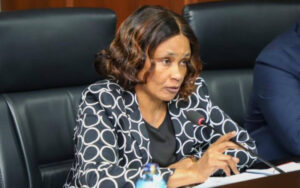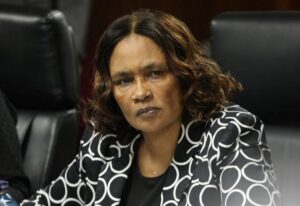The TSC CEO recruitment has triggered a major legal showdown in Kenya over claims of premature advertising, lack of transparency, and constitutional violations. Here’s a detailed breakdown of the ongoing conflict.
The contest to replace former Teachers Service Commission (TSC) chief executive Nancy Macharia has ignited one of the most consequential legal battles in Kenya’s education sector. What began as a routine recruitment exercise has now expanded into a heated constitutional confrontation involving transparency, timing, and the legal boundaries governing public appointments.
The Employment and Labour Relations Court recently dismissed an application by Dr. Adano Salad Kadubo to join the main petition challenging the recruitment process. While the court blocked his attempt to participate as an interested party, the broader petition filed by Kenyan citizen Thomas Mosomi Oyugi continues to raise fundamental questions about how public institutions declare and fill top-level vacancies.
At the heart of the dispute is one key issue: Was the Teachers Service Commission allowed to advertise the CEO position while the incumbent was still in office?
According to Dr. Kadubo, the answer is an emphatic no. He argued that on the date the advertisement appeared—May 6, 2025—Nancy Macharia had not yet left office. Her term was scheduled to end on June 6. He insists that because no vacancy existed at the time of publication, the recruitment process was unconstitutional, premature, and procedurally flawed.
To him, the timing alone was enough to invalidate the entire recruitment process.
But timing was not his only concern. Dr. Kadubo also challenged the manner in which the vacancy was publicized. He told the court that the advertisement appeared only in the My Government newspaper and on the TSC website. In his view, this violated constitutional principles requiring public bodies to ensure transparency through wide, accessible advertising channels.
He noted that My Government newspaper is not a widely circulated publication, calling it obscure and largely unknown to many Kenyans. For a national job affecting the leadership of a commission that manages more than 380,000 teachers, he argued, the vacancy should have been placed in major newspapers and published in the Kenya Gazette. Anything less, he said, unfairly limited public awareness and undermined equal opportunity.
Dr. Kadubo claimed that he only learned about the recruitment after the deadline had passed—an issue he attributed to inadequate publicity.
However, despite his spirited arguments, the court refused to add him as an interested party. According to the judge, the issues he raised were already covered in the main petition filed by Thomas Mosomi Oyugi. The court ruled that he failed to present new evidence or a fresh perspective that would justify expanding the list of participants in the case.
The ruling effectively narrowed the legal stage to the original litigant, but it did not diminish the weight of the ongoing constitutional concerns.
The Main Petition: Larger Questions Still Stand
While the court sidelined Dr. Kadubo, the primary case continues. The petitioner, Mr. Oyugi, raises several constitutional questions that could reshape public service recruitment in Kenya.
Some of the questions include:
-
Can a government body advertise a vacancy before it legally exists?
This question touches on the interpretation of public office tenure, succession planning, and procedural fairness. -
Does the law require national-level job advertisements to appear in newspapers with nationwide circulation?
If the answer is yes, then TSC may have violated transparency principles. -
Must vacancies be formally declared in the Kenya Gazette before recruitment begins?
Gazette notices are often used to make public appointments official and publicly traceable. -
Was the recruitment process equitable and accessible?
Limited circulation of an advertisement may amount to exclusion.
These issues go beyond individual ambition. They strike at the core of how public institutions should operate in a democratic society.
TSC’s Defense: The Process Was Lawful and Transparent
The Teachers Service Commission has strongly defended its actions. Through an affidavit signed by its chairperson, Dr. Jamleck Muturi, the Commission dismissed the allegations as baseless and self-serving.
Dr. Muturi argued that:
-
The recruitment process followed all legal requirements.
-
The advertisement was properly issued.
-
Dr. Kadubo’s desire to become CEO does not equate to a constitutional interest.
-
The court process should not be hijacked by personal ambitions disguised as public interest litigation.
The Commission maintains that it did nothing irregular and that succession planning is normal in public service. Advertising a position ahead of an incumbent’s exit, TSC argues, ensures continuity and prevents leadership gaps.
Why This Case Matters
This case, regardless of the outcome, will set an important precedent.
It could influence:
-
How public service jobs are advertised
-
Whether premature advertisements are legally acceptable
-
How “nationwide circulation” is interpreted in modern media
-
Rights of aspiring candidates to challenge recruitment procedures
-
Transparency standards for constitutional commissions
Kenya’s education sector, already under pressure due to teacher shortages, policy disputes, and budget constraints, is watching closely. A ruling that halts or invalidates the process could delay the appointment of a permanent CEO, affecting thousands of schools and educators.
The petition is now scheduled for a full hearing. While Dr. Kadubo will not be part of the proceedings, his concerns remain embedded in the arguments already presented.
What happens next may redefine the rules governing how Kenya recruits leaders for its most critical institutions.





